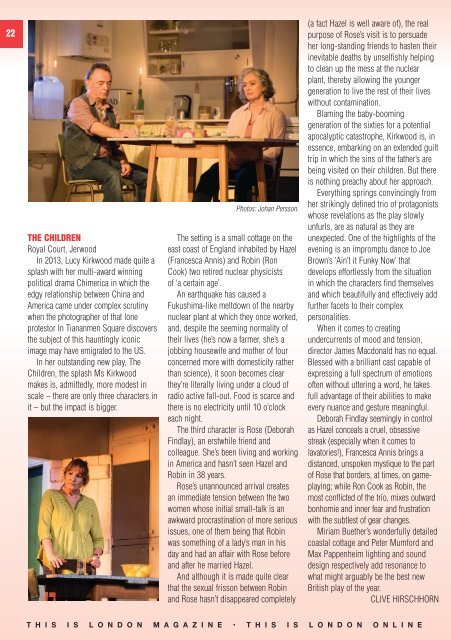til_xmas
Create successful ePaper yourself
Turn your PDF publications into a flip-book with our unique Google optimized e-Paper software.
22<br />
THE CHILDREN<br />
Royal Court, Jerwood<br />
In 2013, Lucy Kirkwood made quite a<br />
splash with her multi-award winning<br />
political drama Chimerica in which the<br />
edgy relationship between China and<br />
America came under complex scrutiny<br />
when the photographer of that lone<br />
protestor In Tiananmen Square discovers<br />
the subject of this hauntingly iconic<br />
image may have emigrated to the US.<br />
In her outstanding new play, The<br />
Children, the splash Ms Kirkwood<br />
makes is, admittedly, more modest in<br />
scale – there are only three characters in<br />
it – but the impact is bigger.<br />
Photos: Johan Persson.<br />
The setting is a small cottage on the<br />
east coast of England inhabited by Hazel<br />
(Francesca Annis) and Robin (Ron<br />
Cook) two retired nuclear physicists<br />
of ‘a certain age’.<br />
An earthquake has caused a<br />
Fukushima-like meltdown of the nearby<br />
nuclear plant at which they once worked,<br />
and, despite the seeming normality of<br />
their lives (he’s now a farmer, she’s a<br />
jobbing housewife and mother of four<br />
concerned more with domesticity rather<br />
than science), it soon becomes clear<br />
they’re literally living under a cloud of<br />
radio active fall-out. Food is scarce and<br />
there is no electricity un<strong>til</strong> 10 o’clock<br />
each night.<br />
The third character is Rose (Deborah<br />
Findlay), an erstwhile friend and<br />
colleague. She’s been living and working<br />
in America and hasn’t seen Hazel and<br />
Robin in 38 years.<br />
Rose’s unannounced arrival creates<br />
an immediate tension between the two<br />
women whose initial small-talk is an<br />
awkward procrastination of more serious<br />
issues, one of them being that Robin<br />
was something of a lady’s man in his<br />
day and had an affair with Rose before<br />
and after he married Hazel.<br />
And although it is made quite clear<br />
that the sexual frisson between Robin<br />
and Rose hasn’t disappeared completely<br />
(a fact Hazel is well aware of), the real<br />
purpose of Rose’s visit is to persuade<br />
her long-standing friends to hasten their<br />
inevitable deaths by unselfishly helping<br />
to clean up the mess at the nuclear<br />
plant, thereby allowing the younger<br />
generation to live the rest of their lives<br />
without contamination.<br />
Blaming the baby-booming<br />
generation of the sixties for a potential<br />
apocalyptic catastrophe, Kirkwood is, in<br />
essence, embarking on an extended guilt<br />
trip in which the sins of the father’s are<br />
being visited on their children. But there<br />
is nothing preachy about her approach.<br />
Everything springs convincingly from<br />
her strikingly defined trio of protagonists<br />
whose revelations as the play slowly<br />
unfurls, are as natural as they are<br />
unexpected. One of the highlights of the<br />
evening is an impromptu dance to Joe<br />
Brown’s ‘Ain’t it Funky Now’ that<br />
develops effortlessly from the situation<br />
in which the characters find themselves<br />
and which beautifully and effectively add<br />
further facets to their complex<br />
personalities.<br />
When it comes to creating<br />
undercurrents of mood and tension,<br />
director James Macdonald has no equal.<br />
Blessed with a brilliant cast capable of<br />
expressing a full spectrum of emotions<br />
often without uttering a word, he takes<br />
full advantage of their abilities to make<br />
every nuance and gesture meaningful.<br />
Deborah Findlay seemingly in control<br />
as Hazel conceals a cruel, obsessive<br />
streak (especially when it comes to<br />
lavatories!), Francesca Annis brings a<br />
distanced, unspoken mystique to the part<br />
of Rose that borders, at times, on gameplaying;<br />
while Ron Cook as Robin, the<br />
most conflicted of the trio, mixes outward<br />
bonhomie and inner fear and frustration<br />
with the subtlest of gear changes.<br />
Miriam Buether’s wonderfully detailed<br />
coastal cottage and Peter Mumford and<br />
Max Pappenheim lighting and sound<br />
design respectively add resonance to<br />
what might arguably be the best new<br />
British play of the year.<br />
CLIVE HIRSCHHORN<br />
t h i s i s l o n d o n m a g a z i n e • t h i s i s l o n d o n o n l i n e

















